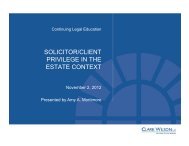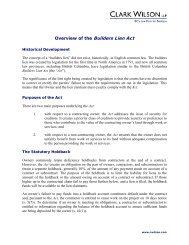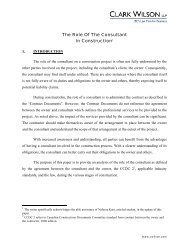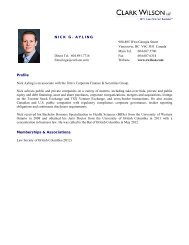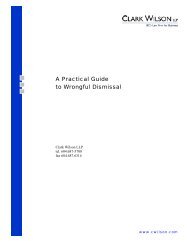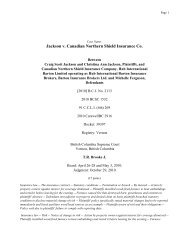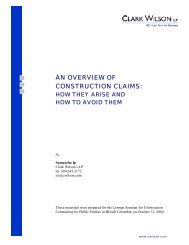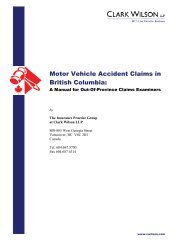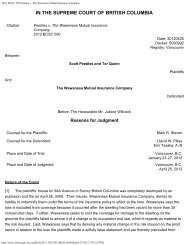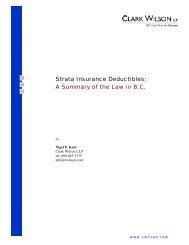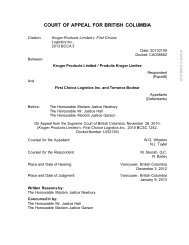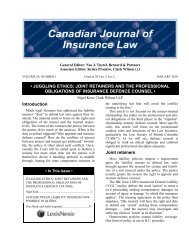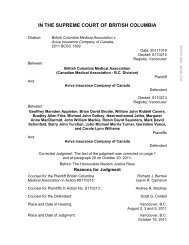juggling ethics: joint retainers and the ... - Clark Wilson LLP
juggling ethics: joint retainers and the ... - Clark Wilson LLP
juggling ethics: joint retainers and the ... - Clark Wilson LLP
Create successful ePaper yourself
Turn your PDF publications into a flip-book with our unique Google optimized e-Paper software.
p. 4<br />
not <strong>the</strong> insured was liable to pay damages in respect to <strong>the</strong> motor accident <strong>and</strong> <strong>the</strong> amount of<br />
<strong>the</strong> damages”. 4<br />
While it is possible some debate may remain in <strong>the</strong> case law, <strong>the</strong>re is no question that <strong>the</strong> Law Society of<br />
B. C. considers <strong>the</strong> appointment by a liability insurer of defence counsel to represent an insured to be a<br />
situation of <strong>joint</strong> retainer. All <strong>the</strong> Law Societies along with <strong>the</strong> Canadian Bar Association, have<br />
promulgated codes of professional conduct which include rules addressing conflicts of interest between<br />
clients. These rules, which are referred to in greater detail below, are drawn in general terms <strong>and</strong> are<br />
not specifically directed to <strong>the</strong> retainer by a liability insurer of defence counsel for an insured.<br />
However, <strong>the</strong> Law Society of British Columbia, more so than any o<strong>the</strong>r Law Society in Canada, has<br />
chosen to specifically address <strong>the</strong> implications of <strong>the</strong> tripartite relationship in <strong>the</strong> context of liability<br />
insurance on several different occasions over <strong>the</strong> years, including insurer‐imposed litigation <strong>and</strong> billing<br />
guidelines (1999), professional negligence in defending third party liability claims (2003), <strong>the</strong> ICBC<br />
“Strategic Alliance Agreement” with its defence law firms (2006) <strong>and</strong> “Third Party Liability Claims” (2008)<br />
5 . From <strong>the</strong> outset <strong>the</strong> LSBC has very clearly stated that “Lawyers defending a claim for damages<br />
pursuant to a policy of insurance … act for both <strong>the</strong> insured <strong>and</strong> <strong>the</strong> insurer”. 6 In its October 2003<br />
bulletin to <strong>the</strong> profession respecting professional negligence in defending third‐party liability claims, <strong>the</strong><br />
LSBC,<br />
“A lawyer appointed by an insurer to defend a third‐party liability claim has two clients: <strong>the</strong><br />
insurer <strong>and</strong> <strong>the</strong> insured. The lawyer owes obligations to both clients … care must be taken by<br />
<strong>the</strong> lawyer to identify <strong>and</strong> avoid conflicts of interest between <strong>the</strong> two clients <strong>and</strong> to ensure that<br />
<strong>the</strong>y are both fully protected”.<br />
The LSBC also issued a bulletin to <strong>the</strong> profession in August 2006 circulating a “draft policy for<br />
discussion”. It was entitled “Joint Retainers in <strong>the</strong> Defence of Third‐Party Liability Claims” <strong>and</strong> it went on<br />
to observe “it seems likely that not all lawyers who practice in this area are complying with <strong>the</strong>ir<br />
obligations [set out in] <strong>the</strong> Professional Conduct H<strong>and</strong>book”. 7 These statements, combined with a<br />
subsequent bulletin issued October 2008 entitled “Third‐Party Liability Claims”, make it very clear that in<br />
so far as <strong>the</strong> LSBC is concerned, <strong>the</strong> appointment by a liability insurer of defence counsel to represent an<br />
insured is indeed a “<strong>joint</strong> retainer” <strong>and</strong> carries with it certain professional <strong>and</strong> ethical obligations <strong>the</strong><br />
breach of which will put <strong>the</strong> defence counsel at risk of disciplinary proceedings.<br />
POTENTIAL CONFLICTS OF INTEREST BETWEEN INSURER AND INSURED<br />
In Fredrikson v. ICBC, (1990) 44 BCLR (2d) 303 (SC), Esson CJSC observed <strong>the</strong> “element of conflict is a<br />
necessary incident of <strong>the</strong> contract [of insurance <strong>and</strong>] in <strong>the</strong> relationship between insurer <strong>and</strong> insured”.<br />
As one author has observed,<br />
4 (1968) 69 DLR (2d) 653 at 660‐61.<br />
5 See Appendices for <strong>the</strong>se notices/bulletins<br />
6 Law Society Ethics Committee Opinion re: Third Party Auditors, May 6, 1999<br />
7 In Olsen, supra. n.3, it was observed “It is not common practice for counsel representing insurer <strong>and</strong> insureds to<br />
advise <strong>the</strong>ir clients in <strong>the</strong> terms required by CH. 6 of <strong>the</strong> PCH”.<br />
© 2009 <strong>Clark</strong> <strong>Wilson</strong> <strong>LLP</strong> cwilson.com<br />
Nigel P. Kent, T. 604.643‐3135.



